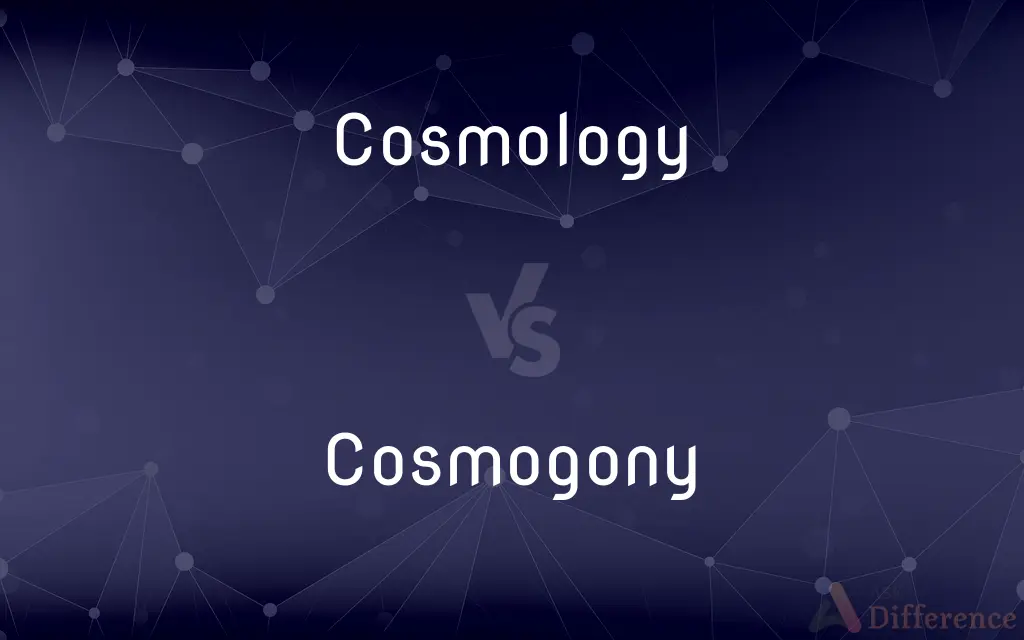Cosmology vs. Cosmogony — What's the Difference?
By Fiza Rafique & Maham Liaqat — Updated on February 23, 2024
Cosmology is the scientific study of the universe's structure and evolution, while cosmogony delves into the origins and creation myths of the universe.

Difference Between Cosmology and Cosmogony
Table of Contents
ADVERTISEMENT
Key Differences
Cosmology is a branch of astronomy that uses scientific methods to understand the universe's large-scale properties and its evolution over time. It encompasses theories like the Big Bang and dark matter. Cosmogony, in contrast, is concerned with various theories and myths about the universe's origins, often blending scientific, philosophical, and religious perspectives to explain how the universe came into being.
Cosmology relies on empirical evidence and mathematical models to explore phenomena like cosmic microwave background radiation, whereas cosmogony might incorporate ancient myths or philosophical ideas, such as those found in Greek mythology or Hindu Vedas, to explain the creation.
Cosmologists often work within the framework of physics to test hypotheses and make predictions about the universe, focusing on observable and measurable phenomena. Cosmogonists, however, might delve into metaphysical questions and the symbolic meanings behind creation stories, offering insights into cultural and historical contexts.
The study of cosmology has led to significant scientific breakthroughs, such as the understanding of black holes and the expansion of the universe. Cosmogony, while not scientific in the traditional sense, provides valuable insights into human thought and the diverse ways cultures understand their place in the universe.
Both fields, though different in approach, reflect humanity's enduring quest to understand the cosmos, from the mechanisms that govern it to the narratives that give it meaning.
ADVERTISEMENT
Comparison Chart
Definition
Scientific study of the universe's structure and evolution
Theories or myths about the universe's origins
Methodology
Empirical evidence, mathematical models
Mythological, philosophical, religious narratives
Focus
Observable phenomena, universe's evolution
Universe's creation, symbolic meanings
Examples
Big Bang Theory, cosmic microwave background
Creation myths in religious texts, philosophical ideas
Purpose
Understand the physical universe and its laws
Explore cultural, historical interpretations of creation
Compare with Definitions
Cosmology
Scientific study of the universe.
Through cosmology, we understand the universe's age as approximately 13.8 billion years.
Cosmogony
Origins and creation myths.
Ancient Greek cosmogony describes the universe's origin from Chaos.
Cosmology
Big Bang Theory.
Cosmology has provided evidence supporting the Big Bang Theory as the universe's origin.
Cosmogony
Philosophical theories of creation.
In cosmogony, the concept of 'Yin and Yang' explains the harmonious creation of the universe in Taoism.
Cosmology
Cosmic microwave background.
The cosmic microwave background is a crucial piece of evidence in cosmology for the Big Bang.
Cosmogony
Symbolic meanings of creation.
Cosmogony often explores the symbolic meanings behind the creation stories, such as the cycles of birth, death, and rebirth.
Cosmology
Expansion of the universe.
Cosmology has demonstrated that the universe is expanding at an accelerating rate.
Cosmogony
Religious narratives.
Biblical cosmogony in Genesis depicts the universe's creation in six days.
Cosmology
Dark matter and dark energy.
Cosmology explores the mysteries of dark matter and dark energy, which constitute most of the universe.
Cosmogony
Cultural interpretations of the universe.
Hindu cosmogony includes the cosmic egg, Hiranyagarbha, from which the universe emerged.
Cosmology
The astrophysical study of the history, structure, and constituent dynamics of the universe.
Cosmogony
A specific theory or model of the origin and evolution of the universe.
Cosmology
A specific theory or model of this structure and these dynamics.
Cosmogony
A philosophical, religious, or mythical explanation of the origin of the universe.
Cosmology
A metaphysical study into the origin and nature of the universe.
Cosmogony
Any specific theory, model, myth, or other account of the origin of the universe.
Cosmology
A particular view (cultural or religious) of the structure and origin of the universe.
Cosmology
The branch of science or philosophy dealing with the origin and nature of the universe as a whole.
Cosmology
A treatise dealing with the original and structure of the universe.
Cosmology
The branch of astrophysics that studies the origin and evolution and structure of the universe
Common Curiosities
Can cosmogony be considered a science?
Cosmogony, while it may include scientific elements, is more often associated with mythology, religion, and philosophy, and is not strictly a scientific discipline.
What does cosmology study?
Cosmology studies the large-scale properties, structure, and evolution of the universe using scientific methods.
Why is the Big Bang Theory important in cosmology?
The Big Bang Theory is a cornerstone of modern cosmology, explaining the universe's origin from a singularity and its subsequent expansion.
What is cosmogony?
Cosmogony involves theories and myths about the universe's origins, often blending scientific, philosophical, and religious views.
Do cosmology and cosmogony ever overlap?
While they have different focuses, both fields can intersect when discussing the universe's origins, especially at the boundary of known science and philosophical or theological speculation.
How do cultural perspectives influence cosmogony?
Cultural beliefs and values significantly shape cosmogonic narratives, reflecting how different societies understand and explain the universe's origins.
How do cosmology and cosmogony differ in methodology?
Cosmology relies on empirical evidence and mathematical models, whereas cosmogony incorporates mythological and philosophical narratives.
What are some examples of cosmogonic myths?
Examples include the Biblical creation story, Greek myths of Chaos, and Hindu narratives of the cosmic egg.
Can new discoveries in cosmology influence cosmogonic beliefs?
Yes, new scientific discoveries can influence cosmogonic beliefs by challenging traditional views and inspiring reinterpretations of ancient myths.
How do modern cosmologists view ancient cosmogonies?
Modern cosmologists might view ancient cosmogonies as symbolic or mythological, offering insights into historical perspectives on the universe rather than scientific facts.
What role does dark matter play in cosmology?
Dark matter is a crucial component in cosmology, accounting for the majority of the universe's mass and influencing its gravitational structures.
How does cosmogony contribute to cultural heritage?
Cosmogony enriches cultural heritage by preserving and transmitting traditional beliefs, creation stories, and interpretations of the universe across generations.
How does cosmology impact our understanding of the universe?
Cosmology provides a scientific framework for understanding the universe's structure, origins, and evolution, leading to discoveries like black holes and cosmic expansion.
What is the significance of the expansion of the universe in cosmology?
The universe's expansion supports the Big Bang Theory and helps cosmologists understand the universe's age, structure, and future evolution.
Is the cosmic microwave background relevant to cosmogony?
While primarily a cosmological evidence for the Big Bang, the cosmic microwave background can also inform cosmogonic discussions regarding the universe's early conditions.
Share Your Discovery

Previous Comparison
Snowmachine vs. Snowmobile
Next Comparison
Azotemia vs. UremiaAuthor Spotlight
Written by
Fiza RafiqueFiza Rafique is a skilled content writer at AskDifference.com, where she meticulously refines and enhances written pieces. Drawing from her vast editorial expertise, Fiza ensures clarity, accuracy, and precision in every article. Passionate about language, she continually seeks to elevate the quality of content for readers worldwide.
Co-written by
Maham Liaqat














































